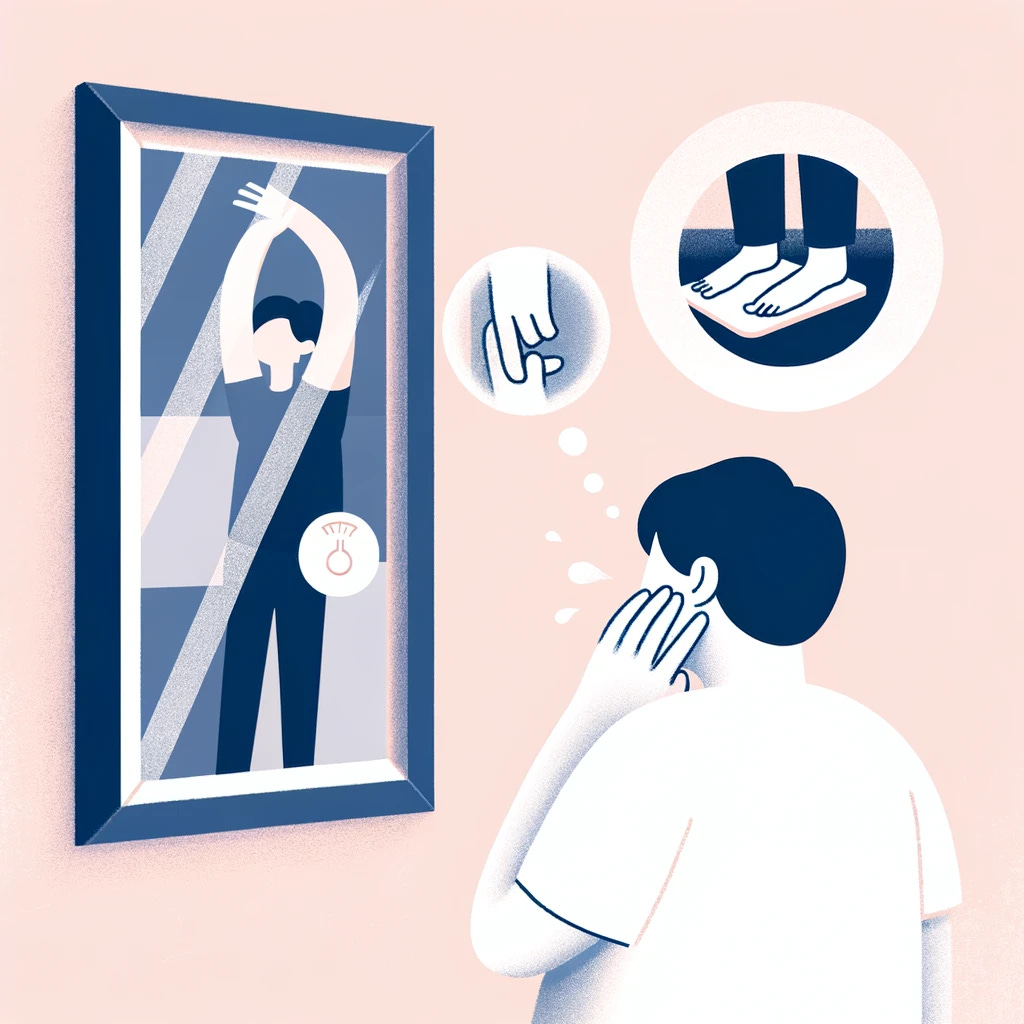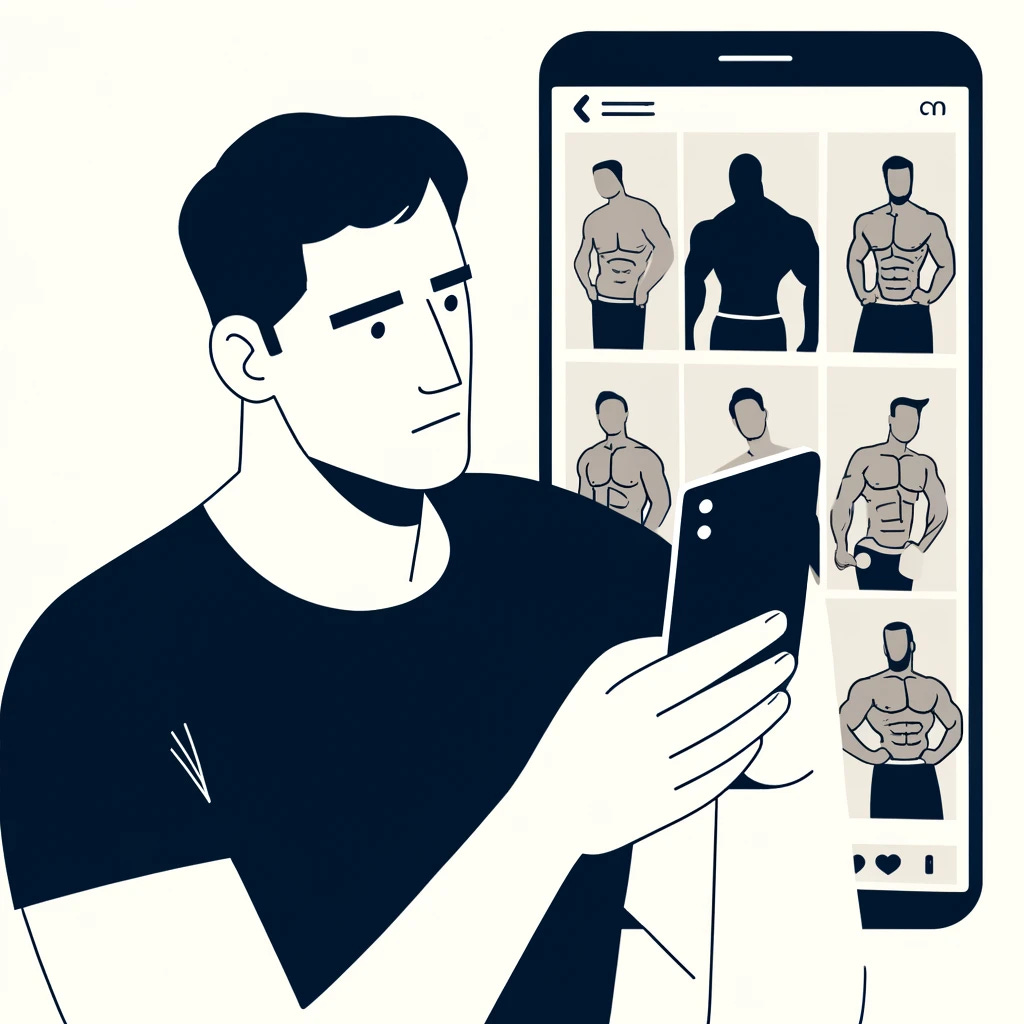Let's talk about body checking - the compulsive need to examine your shape, weight, and different body parts. We all sneak a peek in the mirror now and then, but body checking is overdoing it, taking it to another level. It involves stepping on the scale daily, taking photos of yourself, scrutinizing in the mirror, pinching your skin, or even checking your reflection in windows of shops and houses while walking on the street. This isn't just casual glancing—it's a frequent, obsessive habit, usually focused on specific body parts, and it can have a big effect on your mental health.
Body Checking and Body Image Struggles
Body checking is deeply connected to body image struggles and unmet emotional needs. Imagine you’ve had experiences where you felt invisible, unimportant, or unloved. These feelings can stick with you, creating a deep sense of insecurity. Body checking becomes a way to cope with the painful emotions that are evoked by unmet emotional needs. Checking your body is a misguided attempt to soothe yourself, to reassure yourself that you are seen and that you matter—even if it’s just to you.
Seeking Assurance
For example, if you grew up feeling like you had to earn love or attention through your achievements or appearance, you might turn to body checking, as a way to feel validated. It gives you a momentary sense of control, and worth. But, just like a band-aid on a deep wound, it doesn’t truly heal the underlying issue. The behavior often acts as a safety mechanism or a way to feel more in control.
Body checking can also be a way to soothe uncomfortable feelings that come up, when you are having a bad body image day. You might think that by constantly checking your weight, shape, or specific body parts, you’ll find some comfort, assurance that everything is ‘okay’, or that you are doing ‘damage control’ and you know what to ‘fix’ with your next diet. It's like trying to calm that nagging voice in your head that keeps telling you that something is wrong with your body.
But the reality is that: instead of making you feel better, body checking often leads to more anxiety and dissatisfaction. It's a vicious cycle—each time you check, it can go two ways: You might feel more anxious about the way you look and want to keep checking. Or, you might feel a brief moment of relief, but it quickly fades, leaving you wanting to check again and again.
I am hosting a webinar on June 7, 2024: Coping with Bad Body Image - A Practical Webinar to Improve Your Body Image
Secure your spot TODAY with 15% discount with the code: earlybird15 (Discount ends at midnight, 26th of May)
A False Sense of Control
For many, body checking is also about feeling in control. When other parts of your life feel chaotic or uncertain, focusing on your body can seem like something you can manage. It provides a false sense of predictability and control in a world that often feels out of control. However, this control is just an illusion. The more you engage in body checking, the more it controls you. Instead of feeling empowered, you end up feeling trapped by the constant need to monitor and judge your appearance.
In essence, body checking can be a way to fill emotional voids. You might not even realize you're doing it, but it’s a way to try to meet those unmet needs. While it might provide brief reassurance, it ultimately reinforces feelings of anxiety and inadequacy, trapping you in a cycle of self-monitoring and self-criticism. Recognizing this connection is crucial for breaking the cycle and finding healthier ways to meet your emotional needs.
Other Types of Body Checking
Body checking isn’t only limited to looking in the mirror - thanks to the visual nature of social media. We are no longer posting tweets and inspirational quotes on our profiles, but also photos and videos. The visual platforms have their own unique way of making body checking more common, maybe in a more covert and sinister way:
Dance and Trend Videos: Many video trends involve dancing or physical activities that showcase the whole body. As you scroll through the app, you will notice that people join these trends to get views and likes, often focusing on their appearance. The emphasis on participating in popular dances and challenges can quickly turn into an obsession with how one's body looks on camera, adding another layer to the body checking behaviors fueled by social media.
Outfits of the Day (OOTD): This trend encourages people to showcase their daily outfits, which means showing their bodies. The focus on fashion can quickly turn into a focus on body shape and size. There is an ‘anti’ trend that I really like that goes against this: “Is it a fit or is she just skinny?” where creators re-create outfits on larger bodies to show, effectively demonstrating that some outfits can be worn or shown off when in a smaller body.
Before and After Transformations: Weight loss and fitness transformation videos are super popular on social media platforms. They might seem motivating, but they also push the idea that you can only be happy if you look a certain way: Every before picture shows the person looking extremely sad with bad clothing and terrible lighting, while the after pictures are very slim, with a big grin on the person’s face with complimentary angles. These transformation pictures lead to constant self-comparison and more body checking.
Filters and Editing Tools: TikTok and Instagram are packed with many filters and editing tools that can dramatically change your appearance. Some are so advanced that you may not even notice there is being filter used. These tools can be ‘fun’ to a certain extent, but they also promote unrealistic body standards and make us more critical of our natural selves. The constant use of filters can blur the line between reality and edited perfection, contributing to negative body image and increased body checking behaviors.
How Social Media Keeps Us in the Body Checking Loop
Social media is a huge part of our lives, and it's really shaping how we see ourselves and others. We're constantly bombarded with images of other people, often polished, filtered and perfected. Being exposed to idealized bodies through social media all the time can mess with your reality. Seeing other people’s edited, ‘perfect’-looking bodies can make you compare yourself to them and question what is wrong with your body, even though you are comparing yourself to a body that doesn’t exist. But the endless comparison hurts your self-esteem and worsens body image.
Getting likes, comments, and shares can make us feel good about our appearance, providing external validation that pushes us to keep body checking to look "good enough" for social media approval. Social media algorithms exacerbate this issue by showing us content that gets lots of engagement, meaning we see more posts featuring attractive bodies or dramatic transformations, which reinforce body checking behaviors.
Additionally, social media creates communities where body checking behaviors are shared, discussed, and normalized. Hashtags like #fitspo (fitness inspiration) or #bodygoals can create echo chambers that perpetuate body checking and comparison. Even well-meaning communities focusing on health and wellness can unintentionally promote body checking by emphasizing appearance over mental health.
How to Stop Body Checking
So, you’re probably wondering, “Okay Zeynep, but how do I stop body checking?” Here are some practical steps to help you cut down on or completely stop body-checking behaviours:
Identify the Frequency and Triggers:
Start by noticing how often you check your body and what triggers these behaviours. Keep a diary or make notes on your phone to track these moments and identify patterns.
Use the Thought-Observation Diary:
When you feel the urge to body check, pause and note the situation and your thoughts. Here’s a simple template to guide you:
Situation: Describe what was happening.
Example: "I was watching an episode of Friends while having breakfast."
Stream of Thoughts: List your thoughts without filtering.
Example: "Rachel is wearing a nice dress in this episode. She looks very good, very skinny. Why don’t I look like that? My body is awful. Why am I eating this anyway? Am I bloated?"
Emotions and urges: Write down how these thoughts made you feel.
Example: "I feel insecure, like a failure. I am ashamed of my body. I worry that I am inadequate. This makes me want to check my body"
Rate the Intensity: Give a number to how intense these emotions are (e.g., Insecure: 85/100, Shameful: 55/100).
Healthy Alternative Thought/Behaviour: Develop a healthy alternative way to think about it.
Example: "She is an actress who does this as her job. Every body is unique. An actress looking skinny does not mean I am inadequate.”
Connect with Inner Child and meet your need: Ask yourself “What do I really need here? How can I take care of my Little Self right now?” and meet your needs.
Example: “If I do a body check, I will most likely feel even worse about myself. Let’s not do that. I think I need some comfort and reassurance right now. I can wrap myself in a warm blanket, make myself some tea. I can also go on a walk or meet up with a trusted friend.”
Observe Patterns and Work on Triggers:
After a few weeks, look over your notes to spot common triggers and patterns. Learning about these patterns of triggers can help reduce the urge to body check. When you can’t avoid them, practice observing your thoughts and coming up with healthier alternatives. You can also prepare reminder cards with these messages to carry in your wallet, write in your Notes app on your phone, make them your wallpaper or record voice memos to listen to when feeling triggered.
Download the FREE template of the Thought Observation Diary here.
While social media can push unhealthy body-checking behaviours, we can also use these platforms for positive change. By promoting body positivity, diversity, and self-acceptance, we can help shift the narrative away from unrealistic body standards. Try unfollowing accounts that promote negative body image, curate your feed with diverse and positive content, and join online communities that foster self-love and acceptance.
Overcoming body checking is a journey, and it’s okay to take it one step at a time. You’re not alone in this struggle. Seeking support from friends, family, or a mental health professional can make a huge difference. Your worth isn’t defined by your appearance, and every step you take toward breaking free from body checking is a step toward embracing your true self. It is possible to live in a world where you feel confident and comfortable in your own skin. Believe in your strength and resilience, and be kind to yourself along the way.
🌱Let’s meet for my upcoming webinar: COPING WITH BAD BODY IMAGE - A Practical Webinar to Improve Body Image with a 15% off with the code: earlybird15. Secure your spot TODAY before the discount ends on 26th of May, midnight CET.
🌱I give online and in-person (Leiden, the Netherlands) therapy and counselling sessions for eating disorders, body image struggles and more. Send me a message via realisticbodytherapist.com





